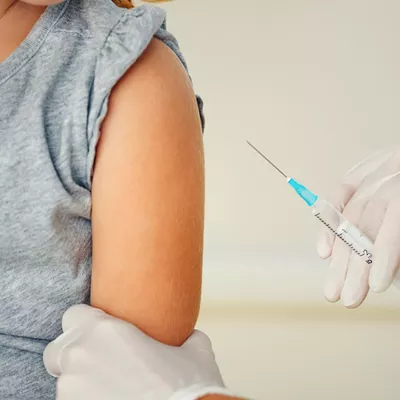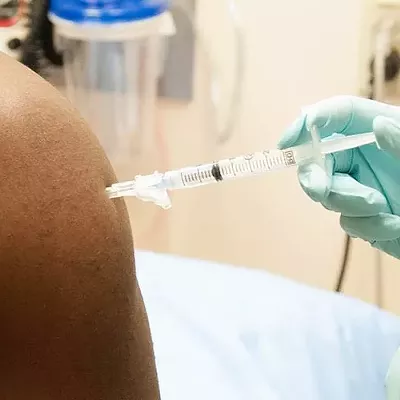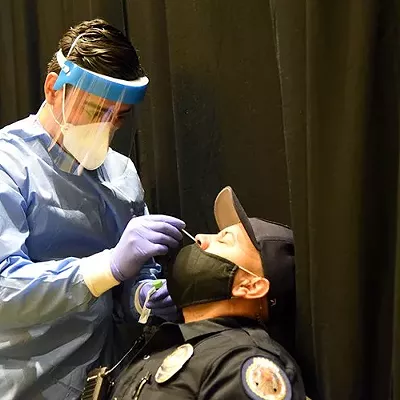Wednesday, May 6, 2020
COVID-19 Claiming Lives Inside Arizona Prisons
At least five Arizona prisoners have died from complications related to COVID-19, validating the fear of many advocates and family members of incarcerated people. Now that the highly contagious virus has infiltrated the state’s prisons, the number of deaths are likely to increase.
In 2019, 11 percent of the state's prison population was over 55 years old. Prison healthcare vendor Centurion recently identified 6,600 incarcerated people that are vulnerable to COVID-19 based on their age group, health status and diagnoses.
One of those vulnerable people is Jenny Scriba’s husband. In 2016, he was convicted of possessing half an ounce of methamphetamine. Because he had a previous criminal record he was sentenced to eight years in prison. He is currently incarcerated in the Arizona State Prison Complex in Douglas, and is set to be released in 2025.
When COVID-19 reached Arizona, Scriba called everyone she could think of—her husband’s attorney, the Arizona Department of Corrections, the Governor’s Office and more—desperately trying to get him moved from the dorm where incarcerated people live communally in a large open room, to a private cell where he could have some chance of isolating away from others.
Her husband has Alpha-1 Antitrypsin Deficiency, a genetic disease that leaves a person extremely vulnerable to lung infections. A COVID-19 diagnosis would likely be fatal.
“They give him a bar of soap and two extra phone calls and that’s what their response to the virus is,” Scriba said. “They just keep telling him he’s perfectly safe. His attorney called the warden, the warden told him that he’s perfectly safe.”
She said the Governor’s Office told her that the state is prepared to handle infectious diseases inside their prisons. But that statement has received pushback from a variety of groups involved in the criminal justice system.
In early March, a coalition of state and nationwide criminal justice reform organizations called for the Arizona Department of Health Services to perform health inspections in all state prisons, as the risk of COVID-19 spread grows each day.
In a letter to DHS Director Dr. Cara Christ, they urged her and other health officials to make sure that Center for Disease Control and Prevention guidelines are being followed consistently inside prisons.
The coalition included examples of why they believe the Department of Corrections, Rehabilitation and Reentry is putting people at great risk of becoming seriously ill. Numerous accounts show "serious inconsistencies between what ADCRR has publicly announced it is doing to adhere to CDC guidelines and the reality of what people who live and work in these facilities are seeing."
These first-hand accounts report a lack of personal and communal hygiene supplies, personal protective equipment and inconsistent health screenings for employees.
"If COVID-19 begins to spread inside our state prisons, it will endanger entire communities where those prisons reside,” AFSC-AZ Program Director Caroline Isaacs said in a press release. “Tens of thousands of people across this state will be impacted: correctional officers, their families, the businesses in their communities, as well as people who are incarcerated and their loved ones."
On April 7, the department announced plans for incarcerated people to make non-medical masks for all prison employees to wear during work. Their announcement did not include whether incarcerated people would get widespread access to masks themselves.
This move came after reports of department leadership actively discouraging employees from wearing masks during work, in order to "prevent panic."
Around the same time, the Arizona Correctional Peace Officers Association announced in a press release that Corrections Director David Shinn, Gov. Doug Ducey and Dr. Christ have all "utterly failed" to protect correctional officers, incarcerated people and the general public from COVID-19.
"Director Shinn has created a COVID19 disaster in Arizona prisons," the association said.
They said the department covered up early reports of correctional officers who contracted COVID-19, and have continuously allowed sick employees to come to work. As of today, 50 correctional staff have reported positive COVID-19 diagnoses.
Scriba was already hearing reports of sick people through her husband before the Department of Corrections released any confirmatory information. Her husband recently witnessed 30 new people come into the Douglas prison from the reception center in Phoenix.
She said the prison staff told everyone that they had been quarantined for 21 days and were all healthy, but there was a debate between people in prison as to whether that is true or not.
During his time in prison, Scriba said her husband has shown a strong change in character. He is enrolled in college classes, hasn’t gotten into any trouble, and is currently at the lowest security classification. This is his second time in prison, but she believes her husband has been a totally different person.
“The fact that I can’t even get him into a cell is seriously so stressful,” Scriba said. “I can't even explain how helpless I feel. I’m just watching and there’s nothing I can do.”
Since her husband went to prison, Scriba has been tasked with caring for their son by herself. She’s afraid of what will happen if she contracts the virus. She doesn’t have a support system near her home in Cochise County to help with childcare, and her nearest family member lives in Texas.
Ultimately, Scriba’s husband was denied the chance to move to a cell because of the order to limit the movements of incarcerated people between prisons.
According to the department’s website, four incarcerated people at the Douglas prison were tested for COVID-19 and their results came back negative. However, Scriba suspects that the virus has already made its way inside the walls that confine her husband and more than 2,000 other incarcerated people.
“Our loved ones are going to die,” Scriba said. “If they figure out that he’s got it, it’ll be way too late. If he gets it, he will die.”
In 2019, 11 percent of the state's prison population was over 55 years old. Prison healthcare vendor Centurion recently identified 6,600 incarcerated people that are vulnerable to COVID-19 based on their age group, health status and diagnoses.
One of those vulnerable people is Jenny Scriba’s husband. In 2016, he was convicted of possessing half an ounce of methamphetamine. Because he had a previous criminal record he was sentenced to eight years in prison. He is currently incarcerated in the Arizona State Prison Complex in Douglas, and is set to be released in 2025.
When COVID-19 reached Arizona, Scriba called everyone she could think of—her husband’s attorney, the Arizona Department of Corrections, the Governor’s Office and more—desperately trying to get him moved from the dorm where incarcerated people live communally in a large open room, to a private cell where he could have some chance of isolating away from others.
Her husband has Alpha-1 Antitrypsin Deficiency, a genetic disease that leaves a person extremely vulnerable to lung infections. A COVID-19 diagnosis would likely be fatal.
“They give him a bar of soap and two extra phone calls and that’s what their response to the virus is,” Scriba said. “They just keep telling him he’s perfectly safe. His attorney called the warden, the warden told him that he’s perfectly safe.”
She said the Governor’s Office told her that the state is prepared to handle infectious diseases inside their prisons. But that statement has received pushback from a variety of groups involved in the criminal justice system.
In early March, a coalition of state and nationwide criminal justice reform organizations called for the Arizona Department of Health Services to perform health inspections in all state prisons, as the risk of COVID-19 spread grows each day.
In a letter to DHS Director Dr. Cara Christ, they urged her and other health officials to make sure that Center for Disease Control and Prevention guidelines are being followed consistently inside prisons.
The coalition included examples of why they believe the Department of Corrections, Rehabilitation and Reentry is putting people at great risk of becoming seriously ill. Numerous accounts show "serious inconsistencies between what ADCRR has publicly announced it is doing to adhere to CDC guidelines and the reality of what people who live and work in these facilities are seeing."
These first-hand accounts report a lack of personal and communal hygiene supplies, personal protective equipment and inconsistent health screenings for employees.
"If COVID-19 begins to spread inside our state prisons, it will endanger entire communities where those prisons reside,” AFSC-AZ Program Director Caroline Isaacs said in a press release. “Tens of thousands of people across this state will be impacted: correctional officers, their families, the businesses in their communities, as well as people who are incarcerated and their loved ones."
On April 7, the department announced plans for incarcerated people to make non-medical masks for all prison employees to wear during work. Their announcement did not include whether incarcerated people would get widespread access to masks themselves.
This move came after reports of department leadership actively discouraging employees from wearing masks during work, in order to "prevent panic."
Around the same time, the Arizona Correctional Peace Officers Association announced in a press release that Corrections Director David Shinn, Gov. Doug Ducey and Dr. Christ have all "utterly failed" to protect correctional officers, incarcerated people and the general public from COVID-19.
"Director Shinn has created a COVID19 disaster in Arizona prisons," the association said.
They said the department covered up early reports of correctional officers who contracted COVID-19, and have continuously allowed sick employees to come to work. As of today, 50 correctional staff have reported positive COVID-19 diagnoses.
Scriba was already hearing reports of sick people through her husband before the Department of Corrections released any confirmatory information. Her husband recently witnessed 30 new people come into the Douglas prison from the reception center in Phoenix.
She said the prison staff told everyone that they had been quarantined for 21 days and were all healthy, but there was a debate between people in prison as to whether that is true or not.
During his time in prison, Scriba said her husband has shown a strong change in character. He is enrolled in college classes, hasn’t gotten into any trouble, and is currently at the lowest security classification. This is his second time in prison, but she believes her husband has been a totally different person.
“The fact that I can’t even get him into a cell is seriously so stressful,” Scriba said. “I can't even explain how helpless I feel. I’m just watching and there’s nothing I can do.”
Since her husband went to prison, Scriba has been tasked with caring for their son by herself. She’s afraid of what will happen if she contracts the virus. She doesn’t have a support system near her home in Cochise County to help with childcare, and her nearest family member lives in Texas.
Ultimately, Scriba’s husband was denied the chance to move to a cell because of the order to limit the movements of incarcerated people between prisons.
According to the department’s website, four incarcerated people at the Douglas prison were tested for COVID-19 and their results came back negative. However, Scriba suspects that the virus has already made its way inside the walls that confine her husband and more than 2,000 other incarcerated people.
“Our loved ones are going to die,” Scriba said. “If they figure out that he’s got it, it’ll be way too late. If he gets it, he will die.”
Tags: Arizona Department of Corrections , Douglas , Prison , COVID19 , Coronavirus , AFSC , Doug Ducey , Cara Christ , Image

















